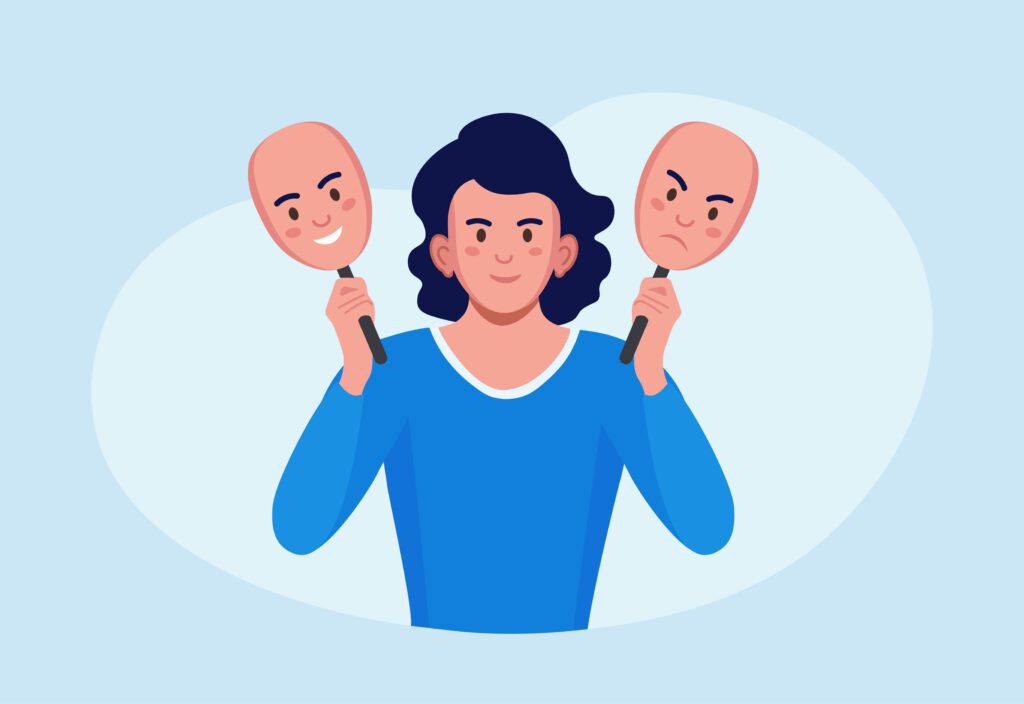Bipolar disorder, a complex mental health condition characterized by extreme mood swings between manic highs and depressive lows, profoundly impacts individuals’ lives and relationships. In this comprehensive overview, we will explore the symptoms, types, psychiatric and psychotherapeutic interventions, and the challenges faced by those living with bipolar disorder. Additionally, we will delve into how Cognitive-Behavioral Therapy (CBT) can be instrumental in managing this condition.
Symptoms
Bipolar disorder manifests in two distinct phases – manic episodes and depressive episodes.
Manic Episodes
- Elevated mood and excessive energy.
- Racing thoughts, impulsivity, and impaired judgment.
- Decreased need for sleep and engagement in risky behaviors.
- Feelings of euphoria, grandiosity, and invincibility.
Depressive Episodes
- Overwhelming sadness, hopelessness, and despair.
- Loss of interest in once-enjoyable activities.
- Changes in appetite, sleep patterns, and energy levels.
- Difficulty concentrating, low self-esteem, and thoughts of suicide.

Types:
- Bipolar I Disorder:
- Involves severe manic episodes, often requiring hospitalization, with or without depressive episodes.
- Bipolar II Disorder:
- Characterized by less severe manic episodes (hypomania) alternating with depressive episodes.
- Cyclothymic Disorder:
- Involves brief periods of hypomanic and depressive symptoms lasting for at least two years.
Interventions:
- Psychiatric Interventions:
- Medication Management: Mood stabilizers, antipsychotics, and antidepressants help manage symptoms. Electroconvulsive therapy (ECT) may be considered in severe cases.
- Therapy Approaches: Cognitive-Behavioral Therapy (CBT), Dialectical Behavior Therapy (DBT), and Mindfulness-Based Cognitive Therapy (MBCT) provide coping strategies and emotional regulation techniques.
- Psychotherapeutic Interventions:
- CBT: CBT is a widely used therapeutic approach that focuses on identifying and changing negative thought patterns and behaviors. For individuals with bipolar disorder, CBT can be particularly helpful in several ways:
- Mood Monitoring: CBT helps individuals recognize triggers and early warning signs of mood shifts. By identifying these patterns, individuals can take proactive measures to prevent the escalation of symptoms.
- Coping Strategies: CBT equips individuals with practical coping strategies to manage stress, anxiety, and depressive thoughts. These techniques include relaxation exercises, problem-solving skills, and restructuring negative thought patterns.
- Enhancing Medication Adherence: CBT can improve medication adherence by addressing concerns, misconceptions, and fears related to medications. It fosters a collaborative relationship between the individual and healthcare providers, promoting a more comprehensive approach to treatment.
- Preventing Relapse: Through CBT, individuals learn to recognize early signs of relapse and develop strategies to prevent recurrence. This empowers them to maintain stability and effectively manage the condition in the long term.
Challenges:
- Social Stigma:
- Individuals with bipolar disorder often face stigma and discrimination, hindering social acceptance and support.
- Relationship Strain:
- Fluctuating moods can strain relationships, leading to misunderstandings and conflicts.
- Employment Difficulties:
- Unpredictable mood swings can impact job performance and stability, posing challenges in maintaining employment.
- Co-occurring Disorders:
- Substance abuse issues and other mental health conditions often accompany bipolar disorder, complicating treatment.
- Financial Stress:
- Medical expenses, coupled with potential job loss, can lead to financial strain and hardship.
In conclusion, understanding the symptoms, types, and challenges associated with bipolar disorder is crucial in providing effective support and treatment. Incorporating therapies like Cognitive-Behavioral Therapy (CBT) into the comprehensive treatment approach empowers individuals to manage their condition actively. By addressing negative thought patterns, enhancing coping skills, and promoting self-awareness, CBT plays a vital role in helping individuals with bipolar disorder lead more stable and fulfilling lives. Through awareness, education, and accessible mental health resources, society can significantly improve the lives of those affected by bipolar disorder.
Ready to begin? Start your online therapy journey today. Book your first session now.




